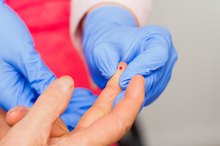Feeling Tired After a Meal? Here's What It Might Mean
Feeling tired after eating can be perfectly normal if you've had certain foods or had a big meal.
Simply feeling tired after eating isn't usually a sign of diabetes (or other medical conditions), Heidi Quinn, RDN, a certified diabetes educator at Harvard's Joslin Diabetes Center, tells LIVESTRONG.com 2.** However, "overall fatigue" might be, she says.
As it turns out, food, fatigue and diabetes are closely linked. Here's what you need to know.
Read more: 9 Surprising Reasons You're Tired All the Time
What Exactly Is Diabetes?
Diabetes is a metabolic disorder in which the body is unable to properly use glucose (or blood sugar), the body's main source of energy, according to the Cleveland Clinic 1.** When you eat, your body metabolizes the carbohydrates in food into glucose. The hormone insulin then helps move the glucose out of the bloodstream and into the cells.
But people with diabetes either don't produce enough insulin (type 1 diabetes) or can't use insulin effectively (type 2 diabetes). This causes glucose to build up in their blood, resulting in high blood sugar.
Elevated blood sugar levels can also be a sign of prediabetes. Prediabetes occurs when blood sugar levels are higher than normal but not high enough to be considered diabetes 2. If left untreated, however, prediabetes can progress into type 2 diabetes, according to the Joslin Diabetes Center 2.
Read more: What to Know About Normal Blood Sugar Levels in Women
- Diabetes is a metabolic disorder in which the body is unable to properly use glucose (or blood sugar), the body's main source of energy, according to the Cleveland Clinic into glucose.
The Link Between Fatigue and Diabetes
Can Carbs and Sugar Cause Acid Reflux?
Learn More
Other symptoms of low blood sugar include:
- feeling hungry
- shaky
- dizzy
- confused or irritable
- according to the Hormone Health Network 3
If you regularly experience these symptoms after eating, see a doctor. Though rare, reactive hypoglycemia can be caused by a number of medical conditions, not just diabetes 4.**
Other Causes of Sleepiness After Eating
What you eat could make you ready for a nap after a meal. Loading up on sugary foods can result in an energy crash, for example. According to the National Sleep Foundation, eating lots of sugar can reduce the activity of orexin cells, which help regulate wakefulness 67.**
Tryptophan, found in turkey, is often cited as the cause of sleepiness after a Thanksgiving feast. Cheese, fish and other high-protein foods also contain the amino acid. Tryptophan tends to increase serotonin levels, one of the hormones involved in sleep, according to the Cleveland Clinic 5.**
But, according to the National Sleep Foundation, tryptophan doesn't immediately make you sleepy 7.** A more plausible cause of post-meal drowsiness? Meal size. "Tiredness after eating may just mean that a person ate too much," says Quinn.
Read more: 4 Reasons You're So Tired After a Workout and What to Do About It
- What you eat could make you ready for a nap after a meal.
- Tryptophan, found in turkey, is often cited as the cause of sleepiness after a Thanksgiving feast.
Related Articles
References
- Cleveland Clinic: "Diabetes Mellitus: An Overview"
- Joslin Diabetes Center: "What Is Prediabetes?"
- Hormone Health Network: "Non-Diabetic Hypoglycemia"
- Mayo Clinic: "Reactive Hypoglycemia: What Can I Do?"
- Cleveland Clinic: "5 Foods That Help You Sleep"
- National Sleep Foundation: "Sweet Dreams: How Sugar Impacts Your Sleep"
- National Sleep Foundation: "What Is Tryptophan?"
- Centers for Disease Control and Prevention. Diabetes and pregnancy: Gestational diabetes.
- Zisser HC, Bevier W, Dassau E, Jovanovic L. Siphon effects on continuous subcutaneous insulin infusion pump delivery performance. J Diabetes Sci Technol. 2010;4(1):98-103. doi:10.1177/193229681000400112
- Lakhtakia R. The history of diabetes mellitus. Sultan Qaboos Univ Med J. 2013;13(3):368-370. doi:10.12816/0003257
- Bryan Bledsoe, DO, FACEP, FAAEM, EMT-P. Journal of Emergency Medical Service. What's the difference between diabetes mellitus and diabetes insipidus.
- American Diabetes Association. Diagnosis and classification of diabetes mellitus. Diabetes Care. 2014;37(Supplement 1):S81-S90. doi:10.2337/dc14-S081
- Center for Disease Control and Prevention. Prediabetes - your chance to prevent diabetes. Updated June 11, 2020.
- Center for Disease Control and Prevention. Type 2 diabetes. Updated: May 30, 2019.
- Centers for Disease Control and Prevention. Diabetes during pregnancy. Updated: June 12, 2018.
- Centers for Disease Control and Prevention. Diabetes and pregnancy: Gestational diabetes.
- Laugesen E, Østergaard JA, Leslie RD; Danish Diabetes Academy Workshop and Workshop Speakers. Latent autoimmune diabetes of the adult: current knowledge and uncertainty [published correction appears in Diabet Med. 2015 Dec;32(12):1670]. Diabet Med. 2015;32(7):843-852. doi:10.1111/dme.12700
- National Institute of Diabetes and Digestive and Kidney Disease. Monogenic diabetes (neonatal diabetes mellitus & MODY). Updated November, 2017.
- Lemelman MB, Letourneau L, Greeley SAW. Neonatal diabetes mellitus: An update on diagnosis and management. Clin Perinatol. 2018;45(1):41-59. doi:10.1016/j.clp.2017.10.006
- American Diabetes Association. Complications.
- American Diabetes Association. Diagnosis.
- American Diabetes Association. Eye exams for people with diabetes.
- Powers, MA. et. al. Diabetes self-management education and support in type 2 diabetes: A joint position statement of the American Diabetes Association, the American Association of Diabetes Educators, and the Academy of Nutrition and Dietetics. Diabetes Care. 2015;38 (7) 1372-1382; doi:10.2337/dc15-0730
- Association of Diabetes Care and Education Specialists. How a diabetes care and education specialist can help you.
- Bluml, BM, Kolb, L, Lipman, R. Evaluating the impact of year-long, augmented diabetes self-Management support. Popul Health Manag. 2019;22(6):522-528 doi:10.1089/pop.2018.0175









